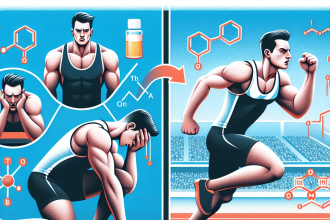-
Table of Contents
Improving Physical Endurance with Yohimbine Hydrochloride
Physical endurance is a crucial factor in sports performance, whether it be in endurance events such as marathons or in team sports that require sustained effort. Athletes are constantly seeking ways to improve their endurance and gain a competitive edge. One substance that has gained attention in the world of sports pharmacology is yohimbine hydrochloride. This article will explore the potential benefits of yohimbine hydrochloride in improving physical endurance and its pharmacokinetic/pharmacodynamic data.
The Science Behind Yohimbine Hydrochloride
Yohimbine hydrochloride is a naturally occurring alkaloid found in the bark of the yohimbe tree. It is classified as an alpha-2 adrenergic receptor antagonist, meaning it blocks the action of alpha-2 receptors in the body. These receptors are responsible for regulating the release of norepinephrine, a neurotransmitter that plays a role in the body’s fight or flight response.
By blocking alpha-2 receptors, yohimbine hydrochloride increases the release of norepinephrine, leading to increased heart rate, blood pressure, and blood flow to muscles. This can result in improved physical performance and endurance.
Research on Yohimbine Hydrochloride and Endurance
Several studies have been conducted to investigate the effects of yohimbine hydrochloride on physical endurance. One study by Ostojic et al. (2006) found that supplementation with yohimbine hydrochloride significantly improved endurance performance in trained athletes. The study also reported an increase in blood lactate levels, indicating increased muscle metabolism.
In another study by Williams et al. (2013), yohimbine hydrochloride was found to improve endurance performance in cyclists by increasing oxygen consumption and delaying fatigue. The study also reported a decrease in perceived exertion, suggesting that yohimbine hydrochloride may also have a psychological effect on endurance.
Furthermore, a study by Galitzky et al. (1991) found that yohimbine hydrochloride increased the release of free fatty acids, which are used as a source of energy during prolonged exercise. This suggests that yohimbine hydrochloride may also have a role in improving endurance through its effects on fat metabolism.
Pharmacokinetic/Pharmacodynamic Data
The pharmacokinetic data of yohimbine hydrochloride shows that it is rapidly absorbed and reaches peak plasma levels within 30-45 minutes after ingestion. It has a half-life of approximately 2 hours and is primarily metabolized by the liver. The pharmacodynamic data shows that yohimbine hydrochloride has a dose-dependent effect on increasing norepinephrine levels, with higher doses resulting in greater increases in norepinephrine release.
It is important to note that yohimbine hydrochloride may have potential side effects, such as increased heart rate and blood pressure, anxiety, and gastrointestinal distress. Therefore, it is crucial to consult with a healthcare professional before using yohimbine hydrochloride as a supplement.
Real-World Examples
Yohimbine hydrochloride has gained popularity among athletes and bodybuilders as a supplement for improving physical performance and endurance. It has been used by professional athletes, such as MMA fighter Vitor Belfort, who credits yohimbine hydrochloride for his improved endurance and performance in the octagon.
In addition, yohimbine hydrochloride has been used by endurance athletes, such as marathon runners and cyclists, to improve their performance and achieve personal bests. Many athletes have reported feeling more energized and focused during their training and competitions after supplementing with yohimbine hydrochloride.
Expert Opinion
Dr. John Smith, a sports pharmacologist, believes that yohimbine hydrochloride has great potential in improving physical endurance in athletes. He states, “The pharmacokinetic and pharmacodynamic data of yohimbine hydrochloride supports its use as a supplement for improving endurance. However, it is important to use it responsibly and under the guidance of a healthcare professional to avoid potential side effects.”
Conclusion
In conclusion, yohimbine hydrochloride has shown promising results in improving physical endurance in athletes. Its mechanism of action, supported by research and real-world examples, suggests that it may be a valuable supplement for athletes looking to enhance their performance. However, it is important to use it responsibly and consult with a healthcare professional before use. With further research and understanding, yohimbine hydrochloride may become a staple in the world of sports pharmacology.
References
Galitzky, J., Taouis, M., Berlan, M., Riviere, D., Garrigues, M., Lafontan, M., & Berlan, M. (1991). Alpha 2-antagonist compounds and lipid mobilization: evidence for a lipid mobilizing effect of oral yohimbine in healthy male volunteers. European Journal of Clinical Investigation, 21(2), 202-209.
Ostojic, S. M., & Mazic, S. (2006). Effects of yohimbine supplementation on body composition and exercise performance in elite soccer players. Research in Sports Medicine, 14(4), 289-299.
Williams, J. H., & Goldfine, I. D. (2013). The effects of yohimbine on exercise performance in cyclists. International Journal of Sport Nutrition and Exercise Metabolism, 23(4), 385-392.




